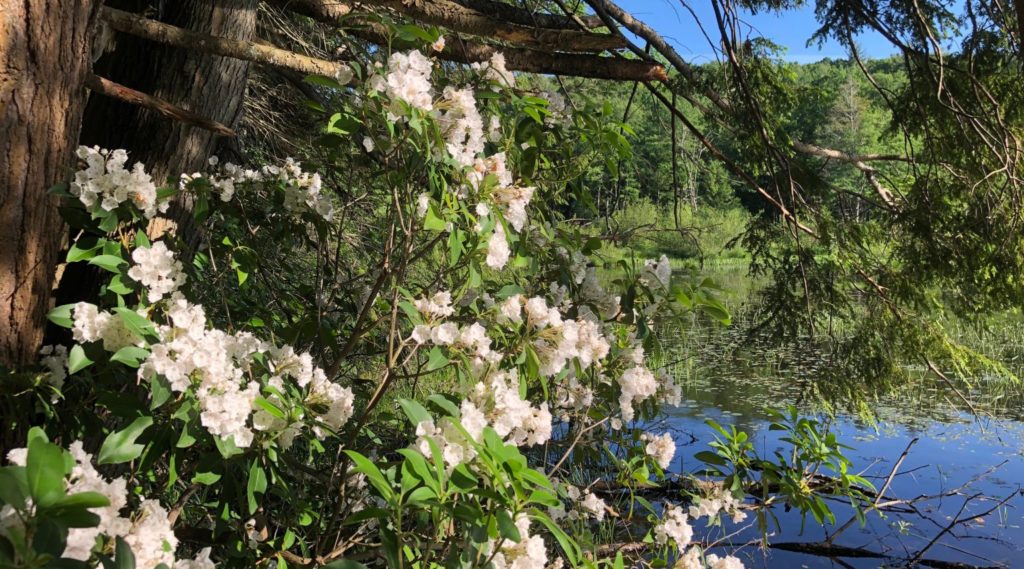Opinion: Local And Green. The Only Path To Climate Success.

Mountain laurel at Puffers Pond. Photo: Russ Vernon-Jones
Editor’s note: A version of this column previously appeared in the Indy on July 2, 2021. It also recently appeared in the Amherst Bulletin.

Along with the alarming findings in the latest United Nations climate report from the IPCC, there’s good news on the climate front. More solar and wind power is being installed all over the world. The international financial industry is slowly withdrawing support for fossil fuel projects.
The president of the U.S. is aiming for net-zero carbon emissions from the electric grid by 2035 and is moving legislation forward to support climate action.
A court in the Netherlands has ordered Shell Oil to reduce the emissions from the use of its products by 45% by 2030. The International Energy Agency, traditionally a conservative outfit, recently reported that humanity can still reach net zero by 2050 if we move quickly, and can meet the world’s energy and development needs without opening any new fossil fuel wells or mines anywhere.
Sales of electric vehicles are expected to accelerate as a new all-electric Ford truck demonstrates the remarkable performance and features that EV’s can provide at a reasonable cost.
Yet the overall picture with our climate is still quite dire and getting worse. Despite all the good news, humans are still putting greenhouse gases into the atmosphere at an unprecedented rate; the climate is being destabilized more severely, and more people around the world are experiencing the disastrous effects. We are approaching a point somewhere in the not-too-distant future where it will no longer be possible to stop the runaway effects of permanent deadly climate change.
Back in 2012 Brad Werner, a geophysicist who works at the Complex Systems Laboratory at UC San Diego, gave a talk which he titled, “Is Earth F**ked?” Speaking to serious Earth and atmospheric research scientists, he asked directly the question that’s on many people’s minds. His answer, succinctly stated, is “Yes,” unless “environmental direct action, resistance taken from outside the dominant culture, as in protests, blockades and sabotage by indigenous peoples, workers, anarchists and other activist groups” can shift things more quickly than all other factors are predicted to be able to produce change.
In other words, our only hope is a powerful people’s climate movement that takes direct action — protests, civil disobedience, and other unified actions. The recent years have verified Werner’s analysis. Those normally relied on — governments, businesses, markets, scientists and experts of all kinds — are failing to solve the global crisis in the absence of a sufficiently large movement.
Facing the magnitude of the climate crisis can lead any of us to feel powerless and despairing. In the struggle to solve the climate crisis, these feelings are often our biggest enemy. Fortunately, we humans actually have a remarkable ability to decide to act and to do what needs to be done, regardless of our feelings.
We can decide to act on the basis of hope, possibility, love, and justice. Fortunately we don’t have to do this alone. There are people everywhere who care about climate justice that we can find and work with for change. So let me ask directly, “Are you active in the climate movement?” “Are you as active as you want to be, given the severity of the crisis that humanity faces?”
Here are some things you can do to make a difference.
1. Join a local climate organization. Attend meetings; join in one of their campaigns or actions. Invite a friend to go with you.
2. Decide now that you will show up at direct action opportunities — rallies, protests, marches, sit-ins, etc. Be sure you are on a mailing list that will notify you of these. You can choose to participate in civil disobedience or not. There are plenty of opportunities to take action completely within the law.
3. Talk about climate regularly with people around you. If you have difficulty starting these conversations or run out of topics, my blog at www.russvernonjones.org offers new ones regularly. You can always say, “I read this blog post that said ….” And then ask people what they think of that idea. You don’t have to be an expert or be able to answer their questions — just get them thinking. You can also invite some of the people you talk with to join you in meetings or actions.
4. Call your local town councilors or select board members and ask what they are doing to prioritize local climate action. Become familiar with your town’s climate action goals and plans. (A new Climate Action and Resilience Plan was recently submitted to the Amherst Town Council.) Once good proposals have been made, help build a groundswell of community support for their rapid adoption and implementation.
5. Get other organizations you are a part of talking about climate. Book groups, religious groups, civic organizations, racial justice groups, etc. can all add climate to the things they learn about and talk about.
6. Donate money to a group tackling climate justice such as the Sunrise Movement, Honor the Earth, Greenpeace, Sierra Club, 350.org, and a host of others. You can join these groups and participate in their campaigns.
7. Other specific actions that you can take every week are available at Inside the Movement (www.itm.earth). Some can be done in only a few minutes.
Numbers Matter
It can be hard to believe that one more person (you) doing these things will make a difference. The truth is that every movement is built one conversation at a time, one email at a time, one action at a time. Numbers matter.
You can help swell the numbers and build our effectiveness as a climate justice movement. Thanks for what you’ve already done and for what you will do.
Russ Vernon-Jones was principal of Fort River School 1990-2008 and is currently a member of the Amherst Community Safety Working Group and of the Steering Committee of Climate Action Now-Western Massachusetts. He blogs regularly on climate justice at www.russvernonjones.org.
